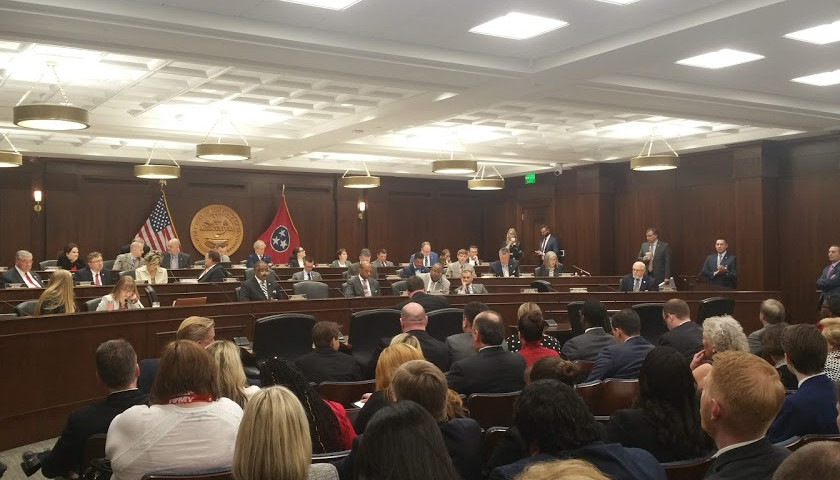NASHVILLE, Tennessee – While the Education Committees of both the House and Senate heard Governor Lee’s bill on a new charter school commission initiative on the same day just hours apart, the process and outcomes were very different between the two bodies.
In the House, in front of a standing room only House Hearing Room I the Education Committee had discussion on HB 0940 carried by Education Committee Chairman Mark White (R-Memphis), for a total of about one and three-quarter hours.
With White being the House Education Committee Chair and carrying the bill, he turned the gavel over to freshman legislator and Education Committee Vice-Chair Kirk Haston (R-Lobelville) to run that part of the meeting.
White started the process by introducing amendment 6140 which rewrites the bill presented to the subcommittee last week. The rewrite was an outcome of the administration listening to the concerns of the subcommittee, as reported by The Tennessee Star, and subsequently making major changes to the bill in response.
Going on with the explanation, White said the 2002 Charter School Act accepted charter schools and in 2011 the cap on the number of charter schools was removed. White then reviewed the current flow chart of charter school authorizations through three authorizers: 1) Local Education Agency (LEA), 2) the Achievement School District (ASD) and 3) the State Board of Education (SBOE).

The first two authorizers are not impacted by the proposed legislation. The legislation only applies to the SBOE and essentially replaces the SBOE in the process.
Currently, a managed charter or “sponsor” in a particular LEA applies to a local school board that either accepts or rejects the application. If the charter application is rejected, the sponsor can appeal to the SBOE that either agrees or disagrees with the local school board. If the SBOE disagrees with the local school board, then the LEA has the option of accepting the charter school or declining. If the LEA declines, then the SBOE acts as the LEA.
Chairman White explained that the SBOE was given the task but not all they need to complete that task. The legislation establishes a charter commission that would replace the SBOE as the authorizer as well performing the LEA function for charter schools under state control. In the role, the charter commission would become the subject matter expert and determine best practices in Tennessee.
Vice Chair Haston called the meeting out of session in order for Department of Education Assistant Commissioner Elizabeth Fiveash and the Governor’s Legislative Director Brent Easely to come forward and answer questions by the Committee members.
A barrage of questions and concerns came from the Committee, starting with Representative Terry Lynn Weaver (R-Lancaster) and included Representatives Mark Cochran (R-Englewood), Kevin Vaughn (R-Shelby County), Scott Cepicky (R-Culleoka), Harold Love (D-Nashville), Antonio Parkinson (D-Memphis), Vincent Dixie (D-Nashville), Tom Leatherwood (R-Arlington), Jim Coley (R-Bartlett), and Jason Hodges (D-Clarksville), focusing on details and wording within the proposed legislation, and responded to by the two witnesses.
With some questions being best answered by the State Board of Education, Nathan James, Deputy Executive Director was called forward.
During the discussion, several Republican members, all freshman, including Kevin Vaughn (R-Shelby County), Scott Cepicky (R-Culleoka), Tom Leatherwood (R-Arlington) and Mark Cochran (R-Englewood) indicated that, for various reasons, they could not support the bill.
This, despite the fact that Cochran, in particular, had previously indicated he would support the measure, as reported by The Star.
About an hour into the meeting and around the time of a more heated part of the discussion, House Speaker Glen Casada (R-Franklin) made an appearance behind the top of the three rows of members seats, speaking with Vice Chair Haston, presumably coaching him on managing the meeting.
Casada is known to be a supporter of school choice initiatives. Earlier this year during a celebration of School Choice Week during which Speaker Pro Tem Bill Dunn (R-Knoxville) was honored by the Tennessee Federation for Children with the 2019 Champion of Choice award, Casada said “Now is the time,” referring to Education Savings Accounts.
In fact, school choice and charter schools are part of the Republican party platform.
After leaving the committee room for about a half hour, Casada and House Assistant Majority Leader Ron Gant (R-Rossville) came back into the room and stood against the wall, providing support and encouragement to the committee members.
In giving his closing statement, White said, “Back to the basics of this bill, basically all we’re doing is going from a State Board doing the same but we’re going to a commission.” Of charters, White said, “We’ve had them for 17 years. I think we need to continue to advance on how that we control, organize and make sure we have the best charters.”
White also reminded the members that a bill passed that says any charter that falls into the bottom five percent is closed automatically within the next year, adding “I wish we had that same bill for any other school that’s not challenging our students.”
Concluding, “If you don’t like charters, I can’t help you. But if you’re okay with the concept that we already have, we’re just going to a commission, then I feel very, very comfortable,” said White, referring to the language in the bill.
Speaker Pro Tem called for the question on the amendment. Not seeing any objections on the call for the question, Haston proceeded directly to a voice vote on the amendment which passed without any obvious no votes.
Representative Antonio Parkinson (D-Memphis) raised his hand, but it was unclear as to the reason at that point. After the amendment was put on the bill and Haston went to take a vote on the bill as amended, Parkinson raised his hand again and requested a roll call vote.
After the first three Republicans voted yes, there were two Republican no votes, followed by two Democrats who split a yes and no vote, and then one Republican yes followed by two Republican no votes, and then one more Republican yes followed by a Democrat no vote. At that point, with 12 votes counted, it was a 6 to 6 split. In the end, the measure passed by a 13 to 9 vote, including five Republicans joining four Democrats as No votes.
Voting Aye were: Charlie Baum (R-Murfreesboro), David Byrd (R-Waynesboro), Scott Cepicky (R-Culleoka), John DeBerry (D-Memphis), Bill Dunn (R-Knoxville), Tom Leatherwood (R-Arlington), Debra Moody (R-Covington), John Ragan (R-Oak Ridge), Iris Rudder (R-Winchester), Jerry Sexton (R-Bean Station), Kevin Vaughn (R-Shelby County), Mark White (R-Memphis) and Ryan Williams (R-Cookeville).
Voting No were: Mark Cochran (R-Englewood), Jim Coley (R-Bartlett), Vincent Dixie (D-Nashville), Kirk Haston (R-Lobelville), Jason Hodges (D-Clarksville), Chris Hurt (R-Halls), Harold Love (D-Nashville), Antonio Parkinson (D-Memphis), Terri Lynn Weaver (R-Lancaster).
In stark contrast, the Senate Education Committee was presented two amendments on SB 0796, being carried by Senator Brian Kelsey (R-Germantown) in a much more streamlined and straightforward manner, followed by a question and answer session with Department of Education Assistant Commissioner Elizabeth Fiveash and the Governor’s Legislative Director Brent Easely, and had a unanimous 8 to 0 roll call vote over about a 15-minute time span.
Shortly after the meeting, the Senate issued a press release announcing the unanimous approval by the Senate Education Committee of legislation establishing an independent state appellate authorizer for charter schools in Tennessee.
The release states that the new commission is given the authority to review appeals, a task previously held by the State Board of Education, and establishes criteria to enhance school facilities.
The bill is part of Governor Bill Lee’s education initiatives designed to improve education opportunities for Tennessee students, according to the release.
The Senator bill sponsor, Kelsey, also sponsored the original High-Quality Charter Schools Act in 2017, which required the State Board of Education to adopt quality authorizing standards and crated the Charter School Facility Fund which awards grants that will be doubled from $6 million to $12 million under Governor Lee’s proposed budget for next fiscal year.
Kelsey was quoted, “I am pleased that Governor Lee worked with local school districts and charter schools to gain unanimous support for the bill.”
“The new commission will ensure that charter school denials will be reviewed by a commission with expertise on quality schools. This law will help ensure that our children will have quality charter schools to attend in Tennessee.”
Senate Education Committee member Raumesh Akbari (D-Memphis), who asked several questions of the Department’s Fiveash and the Governor’s representative Easley, expressed her support for creating the commission.
Akbari found praiseworthy a transparency provision in the legislation that requires commission meetings to be made available for public viewing over the internet and then archived.
Public charter schools will be given the first right of refusal to lease or purchase vacant school property before the facility would be disposed of for non-educational purposes.
“Most public charter schools in our state are offering a great education to our lowest income children for free,” added Kelsey. “We are hopeful that this legislation will encourage more high-quality schools to open in Tennessee.”
HB 0940 and SB 0796 head to their respective Government Operations Committee, with the House version having been scheduled for March 25.
The video on House Bill 0940 can be watched here and Senate Bill 0796 here, and clicking on the bill number.
—
Laura Baigert is a senior reporter at The Tennessee Star.
Photo “Glen Casada” by Glen Casada. Photo “Bill Lee” by Bill Lee.






[…] the support of Speaker Glen Casada (R-Franklin) to get the legislation over the finish line, as reported by The Tennessee […]